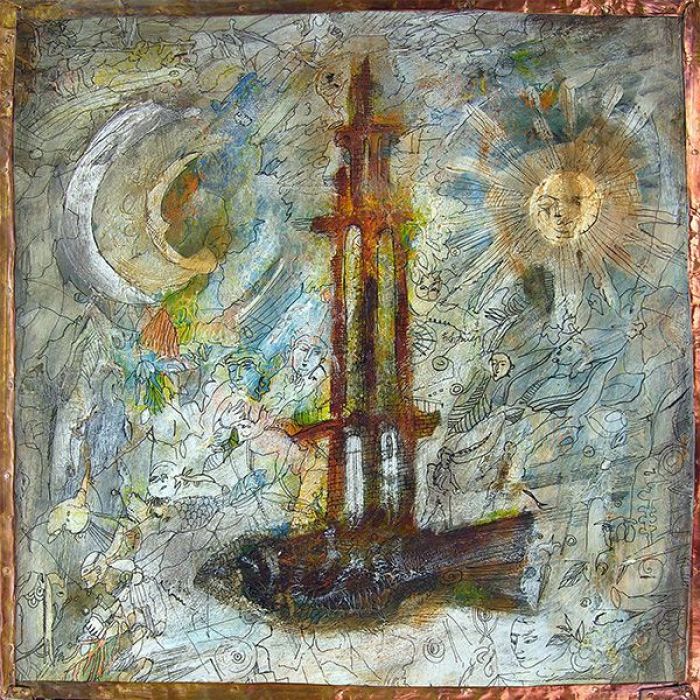Brother, Sister by mewithoutYou (Review)

To put it simply, Brother, Sister is a perfect encapsulation of everything that’s both good and bad about mewithoutYou’s music. Like the band’s previous releases, Brother, Sister is chaotic, sprawling, overwrought, and pretentious. Which has the result of making the music both exciting and passionate but also — well — chaotic, sprawling, overwrought, and pretentious.
The band certainly knows how to rock out as much as ever, but even a cursory read through their lyrics makes it crystal clear that mewithoutYou are attempting to convey more than your typical punk rock messages of angst and rebellion. The lyrics are crammed full of Biblical and spiritual imagery, as lead singer Aaron Weiss seemingly screams, moans, and gasps from one spiritual breakdown, relationship issue, or worldly struggle to the next.
There are countless times throughout the album where Weiss’ lyrics get away from him, where all of the poetic images practically stumble over each other in their rush to be heard (“You were a song I couldn’t sing/Caught like a bear by the bees with its hand in the hive/Who complains of the pain of the sting/When I’m lucky I got out alive” — “Nice And Blue, Pt. Two”).
Sometimes Weiss’ frantic, strained delivery imparts the necessary momentum to keep such lines afloat, sometimes not so much. But for all of his overwroughtness and melodramatics, there are some truly poignant and stirring thoughts that emerge as well (“Open wide my door, my Lord/To whatever makes me love You more” — “C-Minor”).
Some of the album’s more interesting imagery comes in the “Spider” trilogy of songs, which weave together acoustic guitar, horns, and accordion in a folksy manner that is distinctly different than the band’s normally frantic post-punk (though of course, this isn’t the first time the band has woven more interesting elements into their music).
Here, Weiss sings about the such common wonders of the natural world as spiders and mice, and in a manner that would make St. Francis of Assisi proud, draws faith from them (“You made this world to look so nice/I wonder what the next one’s like/Yellow spider, yellow leaf/confirms my deepest held belief”). As with much of Weiss’ lyrics, they can come across as entirely pretentious or quite poignant and moving. More often than not, I find myself in the latter camp.
However every time Weiss’ lyrics get a bit too precocious, that’s the cue for the band to start tearing things up, with erupting guitar solos, spastic rhythms, and walls of feedback and distortion. I’m afraid to freak out too much when those Edge-like guitars mesh with those Franz Ferdinand-esque rhythms on “A Glass Can Only Spill What It Contains“ ‘s outro, or when those same guitars scream high overhead like missiles on “Nice & Blue, Pt. 2,” lest my co-workers get too concerned. And I’ll confess to getting up from my chair on several occasions to rock out alongside the band, even in the process of writing this review.
Besides traipsing through folk territory, the band also weaves in smoky, lethargic, dubby textures and drones on “The Sun & The Moon” — which become increasingly hypnotic as Weiss intones, mantra-like, “The sun and the moon are my Father’s eyes” as the song winds down. As with Weiss’ lyrics, the band is sometimes guilty of cramming in too much from time to time, such as the accordion struggling to be heard above the ragged guitar chords on “In A Market Dimly Lit.”
Brother, Sister is certainly a lot to take in, and can be a chore to wade through. However, you can never accuse the band of not being ambitious, nor can you accuse them of being trite or shallow. For all of their overwroughtness, their emotion never feels anything less than fervent and heartfelt.
All of this is to say that when the band’s music hits its stride, when all of its excesses are successfully fuelled by the right amount of verve and energy — such as “A Glass Can Only Spill What It Contains” or “In A Sweater Poorly Knit” which ends the album on a sweetly trilling harp — the band reveals most of their peers in the indie/emo crowd for the cliches that they are.